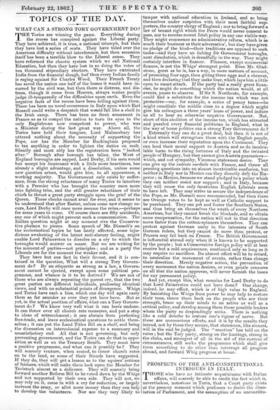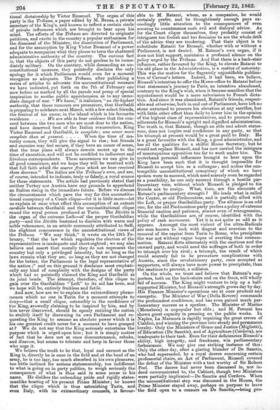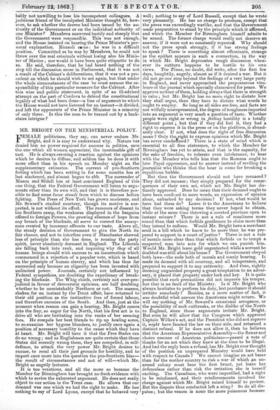PROSPECTS OF THE ANTI-CONSTITUTIONAL INTRIGUES IN ITALY.
THOSE.who have no intimate acquaintance with Italian affairs, will scarcely be able to credit the fact which is, nevertheless, notorious in Turin, that a Court party exists at the present moment which professes to desire the disso- lution of Parliament, and the assumption of an unconstitu- tional dictatorship by Victor Emanuel. The organ of this party is the Tribune, a paper edited by M. Bensa, a private secretary of the King's, and known to reflect a certain circle of private influences which are brought to bear upon his mind. The efforts of the Tribune are directed to originate petitions, and excite in the country a popular enthusiasm for the dismissal of the Ministry, the dissolution of Parliament, and for the assumption by King Victor Emanuel of a power adequate to reorganize what they please to term the shattered administrative authority of the country. The curious fact is, that the objects of this party do not profess to be imme- diately military. On the contrary, while demanding an un- constitutional measure, they pointedly disclaim the only apology for it which Parliament would even for a moment recognize as adequate. The Tribune, after publishing a series of articles to advocate the unconstitutional measure we have indicated, put forth on the 7th of February one now-before us marked by all the parade and pomp of special inspiration to soothe public apprehension as to any imme- diate danger of war. "We lcnow," it italicizes, "on the highest authority, that these rumours are premature, that Garibaldi is preparing to celebrate next March, with a few select friends, the festival of his name, in the island which is his favourite residence We are able to bear evidence that the con- cord between the two men who are most dear to the nation, and have deserved best of the Italian resurrection, King Victor Emanuel and Garibaldi, is complete ; was never more complete than at present When qe time of ma- turity comes, they will give the signal to rise ; but friends and enemies may feel secure, if they have an ounce of sense, that the true plans will always remain• secret up to the time of execution, and will not be confided to indiscreet and frivolous correspondents. These assurances we can give in all good conscience, and we hope they will be received with that full faith which the source from which we have received them deserves." The italics are the Tribune's own, and are, of course, intended to indicate, truly or falsely, a royal source for these statements. The article had previously stated that' neither Turkey nor Austria have any grounds to apprehend an Italian rising in the immediate future. Before we discuss the circumstances which pave the way for this unconstitu- tional conspiracy of a Court clique—for it is little more—let us explain at once what effect this assumption of an entente cordiale between Garibaldi and the unconstitutional clique round the royal person produced at Turin. The Diritto is the organ of the extreme Left—of the proper Garibaldian party—and the Diritto hastened to disclaim with warm and noble vehemence, in an article commonly attributed to Saffi, the slightest concurrence in the unconstitutional. views of the Tribune. "We may think," it wrote on the 13th Fe- bruary, "that the law which regulates the election of the representatives is inadequate and short-sighted ; we may also believe and assert that morally they do not represent the country but only a privileged minority, but so long as the laws remain what they are, so long as they are not changed for the better, the Parliament is the legal representative of the nation ;" and on this ground it disclaims most emphati- cally any kind of complicity with the designs of the party which had so pointedly claimed the King and Garibaldi as its joint heads. The attempt, therefore, of this clique to gain over the Garibaldian "Left" to its aid has been, and we hope will be, entirely fruitless and futile.
And now, how are we to explain the extraordinary pheno- menon which no one in Turin for a moment attempts to deny—that a small clique, ostensibly in the confidence of the King, avowedly claiming to be inspired by him, and by him never disavowed, should be openly enticing the nation to stultify itself by disowning its own Parliament and re- questing the King to assume an absolute power which it is his one_greatest credit never for a moment to have grasped at ? We do not say that the King seriously entertains the purpose which is urged upon him ; but it is simply matter of fact that he does not at once discountenance, rebuke, and disavow, but seems to tolerate and keep in favour those who urge it.
We believe the truth to be that, loyal and earnest as the King is, directly he is once in the field and at the head of an army, he is too lazy, too much absorbed in his own pleasures, too little inclined for serious statesmanship, too indifferent to what is going on in party politics, to weigh seriously the consequence of what is thus said in some sense in his name. He dislikes the unbending pride and rigidly states- manlike bearing of his present Prime Minister; he knows that the clique which is thus astonishing Turin, and even Italy, with its extraordinary counsels, is favour- able to M. Ratazzi, whom, as a companion, he would certainly prefer, and he thoughtlessly enough pays ex- ceedingly little attention to the consequences of even seeming to countenance such evil and disloyal advice. As for the Court clique themselves, they probably consist of intriguers too foolish and too feminine to see the whole drift of the advice they are tendering. That their object is to substitute Ratazzi for Ricaseli, whether with or without a Parliament, is not denied. M. Ratazzi's own organ, if it does not hint support, maintains a profound silence on the policy urged by the Tribune. And that there is a back-stair influence, rather favoured by the King, to elevate Ratazzi to his old place in the Administration, is a matter of notoriety. This was the motive for the flagrantly unjustifiable publica- tion of Cavour's letters. Indeed, it had been, we believe, Ricasoli's intention to offer the Home-office to Ratazzi before that statesman's journey to Paris, an intention abandoned, contrary to the King's wish, when it became manifest that the appointment would be a mere submission to French dicta- tion. And since it was abandoned, Ratazzi's friends, respect- able and otherwise, both in and out of Parliament, have left no stone unturned to procure his elevation at any sacrifice, but with little other effect than daily to lower him in the opinion of the highest class of representatives, and to procure fresh adherents for Ricasoli's upright and dignified administration. The truth is, that Ratazzi, though an able and adroit states- man, does not inspire real confidence in any party, so that his triumph at present would be a great peril to Italy. He is a great favourite with the King, a good administrator, and has all the qualities for a skilful Home Secretary, but he would not replace Ricasoli, and has now carried the intrigues of unscrupulous opposition too far to work under him. The underhand personal influences brought to bear upon the King have been such that it is thought impossible for Ricasoli to accept him as a colleague ; and unless the con- temptible unconstitutional conspiracy of which we have spoken were to succeed, which need scarcely even be regarded as a possibility, he can only succeed through a hostile par- liamentary vote, without which -Ricasoli is pledged to his friends not to resign. What, then, are the elements of Ratazzi's parliamentary strength ? He leads what is called the Centre, or old Piedmontese, and is partially allied with the Left, or proper Garibaldian party. The alliance is an odd one for the old Piedmontese party prefers a policy of extreme financial caution and patience, almost even of retrogression, while the Garibaldians are, of course, identified with the policy of rash movement. Yet it is not quite so odd as it appears. Amongst the most violent of the ultra-Radicals are men known to look with disgust and aversion to the removal of the capital from Turin to Rome, who precipitate the war not without vague hopes of averting that consum- mation. Ratazzi flirts alternately with the cautious and the onward party, and would need the suffrages of both in order to triumph over his rival ; a triumph, the result of which could scarcely fail to be premature complications wall Austria, since the revolutionary party, once accepted as supporters, will always have more power to precipitate, than the cautious to prevent, a collision. On the whole, we trust and believe that Ratazzi's sup- porters, both on the back-stairs and on the front, will wholly fail of success. The King might venture to trip up a half- supported Minister, but Ricasoli's strength grows day by day. His Finance Minister's operations are at once prudent and energetic. The Minister of War (Della Rovere) commands the profoundest confidence, and has even gained much par- liamentary success as a speaker. The Minister of Marine (Menabrea) is unpopular but able ; and M. Peruzzi has shown great capacity in pressing on the public works. In Naples, La Marmora is rapidly repairing the great errors of Cialdini, and winning the province into steady and permanent loyalty: Only the Ministers of Grace and Justice (Miglietti), of Education (De Saudis), and of Agriculture (Cordova), are inadequate to their task. Even for their deficiencies Ricasoli's ability, high integrity, and frankness, win parliamentary forbearance. We may give one striking instance of this: Only the other day, after a glaring blunder of De Sanctis, who had Superseded, by a royal decree concerning certain professorial chairs, an Act of Parliament, Ricasoli covered the defeat of the Minister with a tact worthy of Sir Robert Peel. The decree had never been discussed in, nor in- deed communicated to, the Cabinet, though two Ministers were partially implicated—De Sauctis and Cordova. When the unconstitutional step was discussed in the House, the Prime Minister stayed away, perhaps on purpose to leave the field open to a censure on De Sanctis,—being pro- bably not unwilling to lose his incompetent colleagues. A judicious friend of the inculpated Minister thought fit, how- ever, to ask whether the decree had been issued by the au- thority of the Government or on the individual authority of one Minister? Menabrea answered hastily and sharply that the Government were responsible. This was not enough, and the House insisted on hearing the Prime Minister's per- sonal explanation. Ricasoli came: he was in a difficult position. Committed as he was by Menabrea, he could not throw over the real criminals without losing also his Minis- ter of Marine ; nor would it have been quite etiquette to do so. He said, therefore, that he had heard nothing of the step till the discussion arose in Parliament, that it was not a result of the Cabinet's deliberations, that it was not a pre- cedent on which he should wish to act again, but that under the whole circumstances of the case he must assume the re- sponsibility of this particular measure for the Cabinet. After this wise and politic statement, in spite of an ill-advised attempt on the part of Cordova to defend the constitutional legality of what had been done—a line of argument to which the House would not have listened for an instant—it divided, and left the opponents of the Prime Minister in a minority of only three. Is this the man to be turned out by a back- stairs intrigue ?
































 Previous page
Previous page